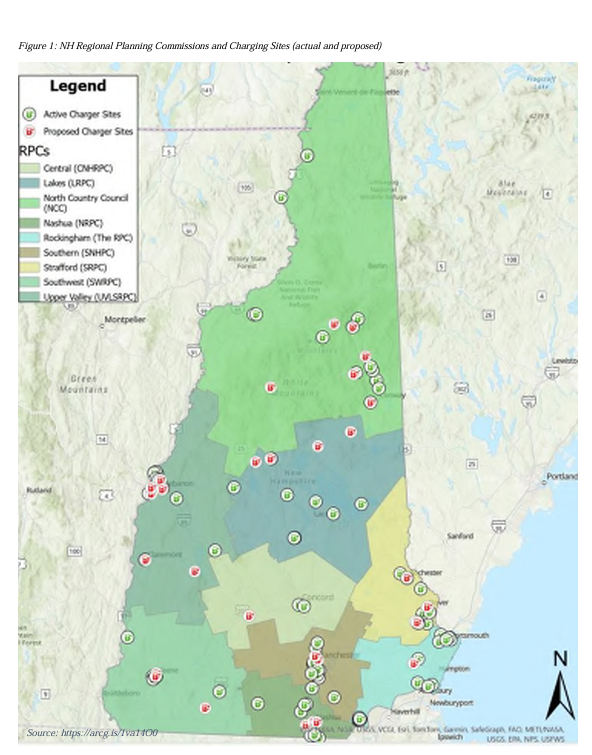Millions of federal EV charging money to New Hampshire now in flux
Some $18 million in federal money New Hampshire has been awarded for electric vehicle charging stations, and another $14 million that was slated to come in the next few years, is in flux after the Federal Highway Administration directed states to stop spending federal money on EV charging programs.
CONCORD, NH – Some $18 million in federal money New Hampshire has been awarded for electric vehicle charging stations, and another $14 million that was slated to come in the next few years, is in flux after the Federal Highway Administration directed states to stop spending federal money on EV charging programs.
New Hampshire’s $2.8 million National Vehicle Infrastructure Grant program Phase 1 has been paused, according to a state Department of Transportation spokesperson. The state was due to get a total of $17.2 million over five years for EV charging station buildout, according to U.S. Department of Transportation reports.
The state is waiting to find out from its “federal partners” what will happen with $15 million in a federal Charging and Fueling Infrastructure Grant it was awarded last month, Jennifer Lane, chief communications officer for the commissioner’s office of NH DOT told Ink Link Monday.
Both programs have been seen by congressional representatives, state business and tourist officials and businesses across New Hampshire as a way to boost the state’s economy by encouraging more visitors, tourists and people relocating from out of state.
New Hampshire has the fourth-lowest ratio of public EV charging stations to registered electric vehicles in the nation, 1:112, according to state and federal statistics.

EV charging stations are vital to supporting electric car ownership “among New Hampshire residents, especially those in low- and moderate-income neighborhoods, and multi-family dwellings where home charging is often not feasible,” Nashua Mayor Jim Donchess and Manchester Economic Development Director Jodie Nazaka, wrote in letters of support for the CFI grant application in September..
“Given the rise in the number of multi-unit dwellings in Nashua’s downtown and surrounding neighborhoods, expanding public EV charging infrastructure in these areas is imperative to ensure an equitable transition to electric vehicles,” Donchess wrote. “Beyond supporting marginalized areas and diverse populations, this funding would play a vital role in bolstering travel and tourism, which is particularly important to our local economies. Expanding EV charging infrastructure will benefit New Hampshire’s communities and the entire state.”
Nazaka wrote, “An investment in NH’s urban and rural disadvantaged communities would increase access to clean transportation options and spur economic benefits.”
2 EV programs, $35 million for NH
Trump, on Jan. 20, paused billions in funding for the nationwide buildout of fast electric car chargers that had been allocated to states through Biden administration programs. He called EV charging station buildout “an incredible waste of taxpayer dollars.”
Late last week, the Federal Highway Administration sent letters to states ordering them to halt their NEVI plans. States like New Hampshire, that were in the process of finalizing plans, must now pause them awaiting further instructions, according to the FHA. No orders as of Monday have specifically addressed the CFI grant money.
New Hampshire’s $2.8 million proposal for Phase 1 of the NEVI plan, which had been in the works since 2022, was scheduled to begin this summer, after Governor and Executive Council approval.
The program provides funding to states so they can develop a strategic and connected electric vehicle charging network that would provide easier access and reliable charging for EV drivers. The money was allocated as part of the Biden administration’s Infrastructure Investment and Jobs Act and administered by the U.S. Department of Transportation’s Federal Highway Administration.
Phase 1 of New Hampshire’s NEVI plan was to install charging stations along Interstate 93 and Route 16. The state’s vision was to have a connected charging infrastructure “to encourage electric vehicle travel, maintain economic competitiveness, and stimulate public-private sector collaboration in the State of New Hampshire,” a news release a year ago said.
Four projects that were approved by the state transportation department and slated to begin this year were:
• Revision Energy, White Mountain Visitor Center, North Woodstock
• Gridwealth EV, 75 Laconia Road, Tilton
• Gridwealth EV, 127 Market Place Blvd, Rochester
• Global Montello Group , Global Mobil Mart, Sanbornville
The $15 million for New Hampshire’s Community Electric Vehicle Charging Project, announced in early January, is part of $5 billion in allocations funded by the Bipartisan Infrastructure Law.
New Hampshire was one of seven states that received their first CFI grant awards with the January allocation. The state had first applied in 2023.
The grant money would be used to enhance public EV charging infrastructure across the state, in both rural and urban areas. The state’s program aims to improve access to electric vehicle charging across nine regions and install 199 charging ports.
The state in 2023, when it unveiled the project, said the grant will allow the state to :
- Enable drivers to charge EVs at their destinations
- Encourage EV drivers to drive to walkable downtown areas
- Enable residents without their own garages or driveways to charge EVs
- Support historically underserved and often overlooked communities
Priority locations for the project are commerce or culture centers, rural locations, areas close to multi-unit dwellings, tourist attractions, parks and public spaces and near transit hubs.
Tourism, economic development
In it’s September application for the CFI grant, the state said sites for the EV charging network included White Mountains region and the central Lakes region tourist areas, as well as regional transportation hubs and five in the state’s two largest cities, Manchester and Nashua. Letters of support included in the application ranged from the state’s congressional delegation, city and town officials, state planning agencies, to businesses like car dealers and rental agencies, ski areas and more.
The northern, Upper Valley, Monadnock and Seacoast sites “connect NH residents and out-of-state and Canadian visitors to major interstate and intrastate transportation corridors,” the application said.
“Nearly 95% of identified project sites are located either within or directly adjacent to a disadvantaged community or rural area,” the application added.
The application points out that Manchester and Nashua are the state’s most diverse and disadvantaged municipalities, both of which would benefit from more public EV charging stations.
The CFI grant plan is for two in the north area of the city, where the aren’t any publicly available – one at Livingston Park and one at Derryfield Park.
In Nashua, the plan is for three in three separate areas of the city – at 9 Stadium Drive (Stellos Stadium), 15 High St., and 25 Crown St. (municipal parking lots).
“Nashua is a growing city, serving both as a major hub for commuters to the Boston Metropolitan Area, and increasingly as an economic and service center in its own right,” the application says.

